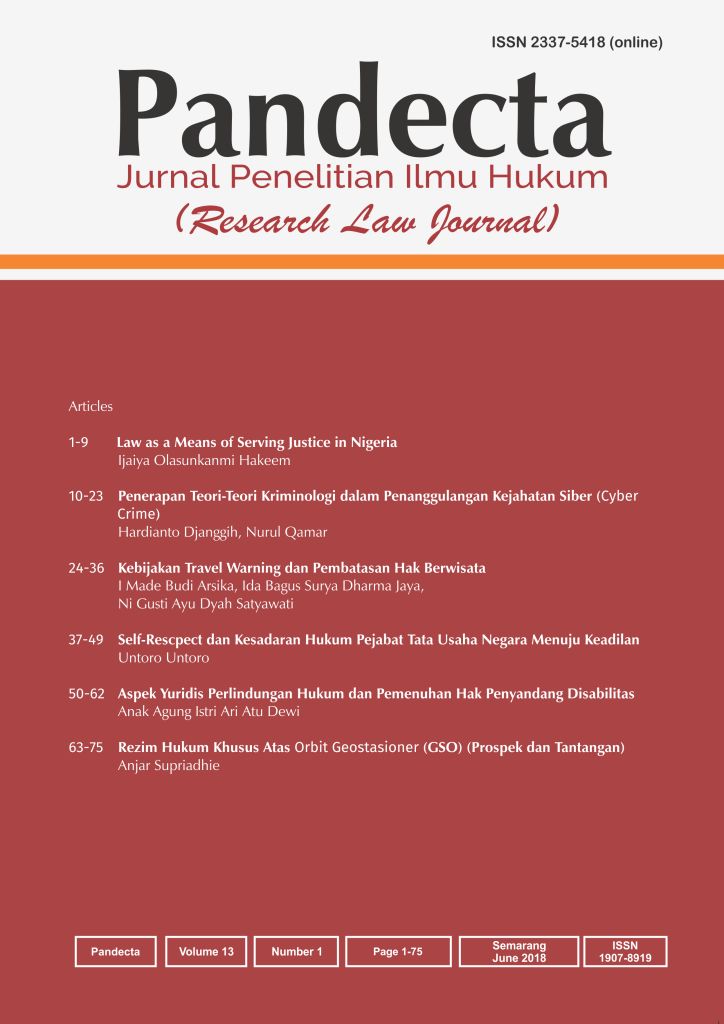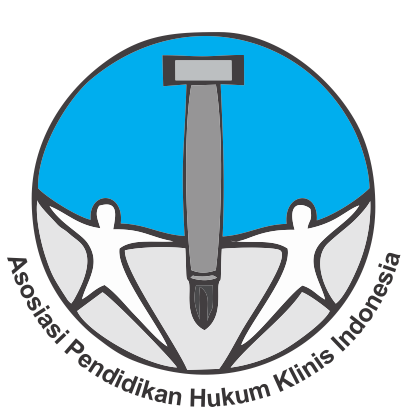Public Effort and Participation in the Enforcement of Corruption Eradication in Indonesia
(1) Faculty of Law, Universitas Asahan, Indonesia
(2) Faculty of Law, Universitas Asahan, Indonesia
Abstract
Corruption remains a pressing issue with far-reaching adverse effects on numerous aspects of human existence globally. Combating corruption is a crucial priority in Indonesia that requires concerted efforts. This study employs a normative legal research methodology to construct and conceptualize laws based on applicable doctrines and legal concepts. In addition, it employs a case study approach to investigate specific instances of corruption in depth. This study aims to provide an overview of the regulations regarding the eradication of corruption and to demonstrate how community involvement can contribute to enforcing anti-corruption measures. The results show that Law Number 1 of 2023 concerning the Criminal Code in the article concerning corruption, the penalties set for corruptors are very far from what they are entitled to receive. In relation to reports of corruption cases, this study suggests that a public education strategy aiming at educating the general public directly or via social media must be conducted. This strategy intends to increase public awareness and encourage membership in the IFC (Indonesia is Free of Corruption) organization, which provides legal protection against alleged corruption offenders. In addition, regarding the punishment for corruptors, DPR RI (House of Representatives) are suggested to revise the current law that perpetrators of corruption who have amassed more than Rp 100,000,000 will face court-determined punishments, such as the return of illicit gains or the maximum penalty of the death penalty.
Keywords
Full Text:
PDFReferences
Anjari, Warih. “Penerapan Pidana Mati Terhadap Terpidana Kasus Korupsi.” Masalah-Masalah Hukum 49, no. 4 (2020): 432–42.
Bakhtiar, Nur Yusriyyah, and Muhammad Rinaldy Bima. “Pemenuhan Hak Kebebasan Berpendapat Berdasarkan Undang-Undang Nomor 9 Tahun 1999 Tentang Kemerdekaan Berpendapat Di Muka Umum.” Journal of Lex Theory (JLT) 1, no. 1 (2020): 41–58.
Benuf, Kornelius, and Muhamad Azhar. “Metodologi Penelitian Hukum Sebagai Instrumen Mengurai Permasalahan Hukum Kontemporer.” Gema Keadilan 7, no. 1 (2020): 20–33.
Cotterrell, Roger. Law, Culture and Society: Legal Ideas in the Mirror of Social Theory. Routledge, 2017.
Databoks, “Ada 1.351 Kasus Tindak Pidana Korupsi yang Ditangani KPK Sepanjang 2004 hingga 2022” http://databoks.katadata.co.id/ (accessed: 11/07/2023)
Databoks, “Ini Koleksi Mobil Lukas Enembe, Gubernur Papua yang Ditangkap KPK” http://databoks.katadata.co.id/ (accessed: 11/07/2023)
Databoks, “KPK Tangani 120 Instansi yang Terjerat Tindak Pidana Korupsi Sepanjang 2022, Apa Saja?” http://databoks.katadata.co.id/ (accessed: 11/07/2023)
Databoks, “Selain Johnny G Plate, Ini Menteri-menteri Era Jokowi yang Terjerat Kasus Korupsi” http://databoks.katadata.co.id/ (accessed: 11/07/2023)
Ebekozien, Andrew. “Corrupt Acts in the Nigerian Construction Industry: Is the Ruling Party Fighting Corruption?” Journal of Contemporary African Studies 38, no. 3 (2020): 348–65.
Fajrin, Yaris Adhial, Arista Putri Purnamasari, Ryvina Izza Rosyida, and Dwi Faizah Maulidiyah. “Death Penalty for Corruptors in Indonesian Human Rights Perspective.” Unnes Law Journal: Jurnal Hukum Universitas Negeri Semarang 6, no. 2 (2020): 287-404.
Hakim, Bawon Nul. “Fungsi Pengawasan Dewan Perwakilan Rakyat Daerah Terhadap Pelaksanaan Anggaran Pendapatan Dan Belanja Daerah.” CERMIN: Jurnal Penelitian 3, no. 2 (2019): 97–109.
Hasan, Hasananuddin. “Hierarki Peraturan Perundang-Undangan Negara Republik Indonesia Sebagai Suatu Sistem.” Madani Legal Review 1, no. 2 (2017): 120–30.
Heywood, Paul M. “Combating Corruption in the Twenty-First Century: New Approaches.” Daedalus 147, no. 3 (2018): 83–97.
Huda, Ni’matul. Hukum Pemerintahan Daerah. Nusa Media, 2019.
Ioannidou, Alexandra. “A Comparative Analysis of New Governance Instruments in the Transnational Educational Space: A Shift to Knowledge-Based Instruments?” European Educational Research Journal 6, no. 4 (2007): 336–47.
Khan, Anupriya, and Satish Krishnan. “Conceptualizing the Impact of Corruption in National Institutions and National Stakeholder Service Systems on E-Government Maturity.” International Journal of Information Management 46 (2019): 23–36.
Kontan, “Hanya 3 Tahun, Harta Kekayaan Johnny G Plate Naik Dari Rp 126 M Jadi Rp 191 M” kontan.co.id (accessed: 11/07/2023)
Lewis, Blane D, and Adrianus Hendrawan. “The Impact of Public Sector Accounting Reform on Corruption: Causal Evidence from Subnational Indonesia.” Public Administration and Development 40, no. 5 (2020): 245–54.
Lindawaty, Debora Sanur, Dewi Sendhikasari Dharmaningtias, Handrini Ardiyanti, and Riris Katharina. Peningkatan Kualitas Pelayanan Publik Di Indonesia. Yayasan Pustaka Obor Indonesia, 2018.
Lino, André Feliciano, Ricardo Rocha de Azevedo, André Carlos Busanelli de Aquino, and Ileana Steccolini. “Fighting or Supporting Corruption? The Role of Public Sector Audit Organizations in Brazil.” Critical Perspectives on Accounting 83 (2022): 102384.
Pinilih, Sekar Anggun Gading. “Politik Hukum Kedudukan KPK Sebagai Lembaga Pemberantasan Korupsi Di Indonesia.” Jurnal Hukum Progresif 8, no. 1 (2020): 15–27.
Pohan, Sarmadan. “Perbandingan Lembaga Anti Korupsi Di Indonesia Dan Beberapa Negara Dunia.” JUSTITIA: Jurnal Ilmu Hukum Dan Humaniora 1, no. 1 (2018): 271–303.
Rinjani, Diliya Mariam. “Efektivitas Penegakan Hukum Terhadap Tindak Pidana Korupsi Secara Massal Anggota Legislatif Daerah.” Wacana Paramarta: Jurnal Ilmu Hukum 19, no. 2 (2020): 69–78.
Rothstein, Bo. “Fighting Systemic Corruption: The Indirect Strategy.” Daedalus 147, no. 3 (2018): 35–49.
Saskarayani, Ida Ayu Gede Mirah, and Kadek Krisna Puspawati. “Legal Analysis Of Corruption Cases Social Assistance The Minister Of Social Responsibility Based On The Criminal Action Of Corruption And Its Impacts.” Ganesha Law Review 3, no. 1 (2021): 56–67.
Sihombing, Sabrina O. “Youth Perceptions toward Corruption and Integrity: Indonesian Context.” Kasetsart Journal of Social Sciences 39, no. 2 (2018): 299–304.
Suyatna, Uyat. “Evaluasi Kebijakan Tindak Pidana Korupsi Di Indonesia.” Sosiohumaniora 22, no. 3 (2020): 325–33.
Waluyo, Bambang. Pemberantasan Tindak Pidana Korupsi: Strategi Dan Optimalisasi. Sinar Grafika, 2022.
Zaidan, Muhammad Ali. “Sociological Approach to Eradication Corruption in Indonesia (Alternative to Imprisonment).” The Indonesian Journal of International Clinical Legal Education 1, no. 1 (2019): 3–18.
Zulyadi, Rizkan. “Judge’s Role in Court to Eradicate Corruption According to Law Number 20 in 2001 (Study of Decision 16/PID. SUS. K/2011/PN. MDN).” Budapest International Research and Critics Institute-Journal (BIRCI-Journal), 2020, 1280–88.
Zysman‐Quirós, Diego. “White‐Collar Crime in South and Central America: Corporate‐State Crime, Governance, and the High Impact of the Odebrecht Corruption Case.” The Handbook of White‐collar Crime, 2019, 363–80.
Refbacks
- There are currently no refbacks.


